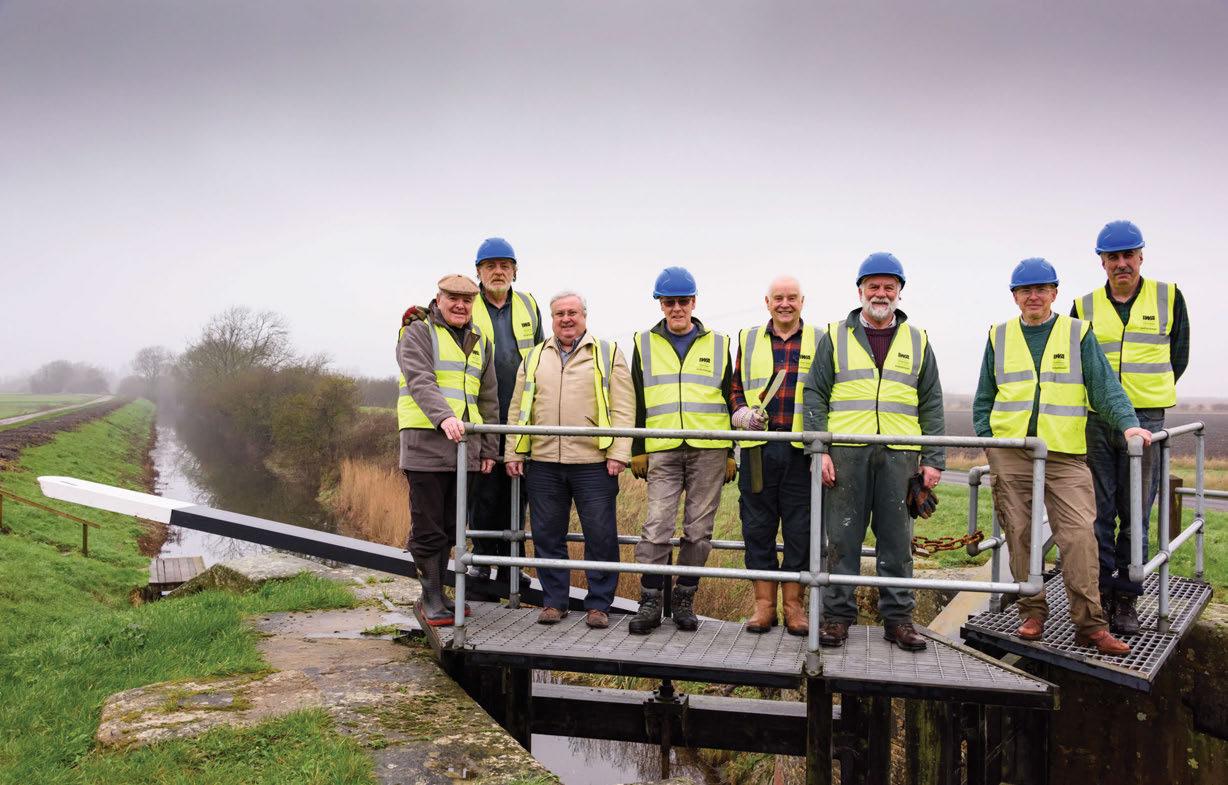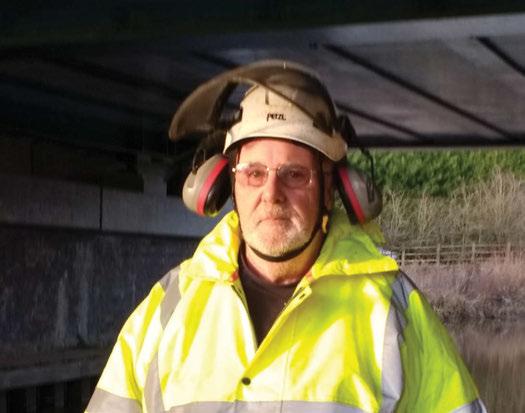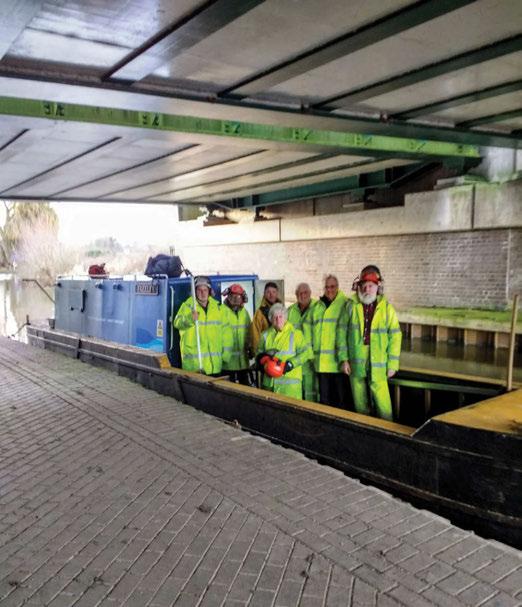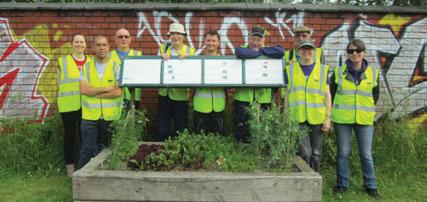
14 minute read
Year of the Volunteer
If 2020 is the year you’re planning to get more involved with the waterways, IWA could have a volunteer role tailored to your particular skillset and interests. In the first of a series of features, we spotlight three positions to whet your altruistic appetites…
Job Description:
Branch Planning Officer
In a nutshell, the role of planning officer is to monitor planning applications for those that may affect local waterways. To do this you’ll likely be trawling council websites to keep up to date with the latest developments, and submitting responses of support or objection to planning applications that may impact canals or rivers in the area.
A knowledge of planning issues is useful, but not essential, and the branch committee will offer advice as to what response should be submitted in specific situations.
Planning applications can be found on local authority websites, and feedback can also be submitted online, so access to a computer and the internet is useful. The planning officer is also responsible for responding to wider plans issued by local authorities, and again this information can be shaped by comments from the whole committee and coordinated by the planning officer.
There is scope to make of this job what the volunteer wants, including opportunity to define the geographical area you wish to cover or a particular specialism, such as heritage issues or local development frameworks.
An IWA work party at Horseways Channel. MIkE DAINEs
Case study: Ray Gill
Planning and Navigation Officer for West London Branch
What attracted you to the role?
I took up the role in 2011 in response to a request for help when our previous branch planning officer retired due to ill health. The role appealed as I thought it would allow me to discover more about the canal network in west London, including heritage issues and the pressures of new development on the waterways. It was something that would involve site visits along the canal as well as research I could do at home on the computer.

I joined IWA in 1987 and my only volunteering before taking up the planning officer position was the occasional towpath clear-up.
How many hours do you spend on the role per week?
On average I probably spend up to 10 hours per week, but this varies from week to week according to the number and the size of new planning applications adjacent to the canal. The West London Branch has 36 miles of canal falling within the boundaries of nine local authorities, as well as the newly created Old Oak and Park Royal Development Corporation.
The IWA branches within the Greater London area probably review many more planning applications than most branches, so the role is perhaps more time consuming in comparison to the rest of the country. Since 2017 I have been fortunate to share the role with a second planning officer, Roger Still, who has now also taken on the role of chairman of our branch. I would definitely encourage other branches to consider splitting the planning officer role in this way. Apart from sharing the load it is great to be able to discuss responses to planning issues with a fellow planning officer.
Applications for large developments are generally supported by numerous technical documents that require review to determine if there will be an impact on the canal. We do not always comment on all planning applications as we find some will actually improve the waterway environment or offer wider regeneration opportunities. Preparing responses to Local Plan consultations or to very large development applications, particularly if we are objecting, does take time but one quickly develops an approach and ‘language’ that speeds up the process.
What do you enjoy about it?
I try to keep our branch well informed about the planning situation and prepare a short report for our committee meetings. A picture speaks a thousand words so one of the things I most enjoy is preparing a slide presentation of the current planning issues. The slides are generally location plans and computer-generated images extracted from planning application documents.
Apart from seeing my branch committee on a regular basis, I have found the role has involved meeting many other people including Canal & River Trust staff, council officers, developers and local amenity groups. When I have time I attend pre-application workshops and local authority planning committee meetings as an observer when major applications are determined.
I believe the role of an IWA planning officer is very much a gradual process of influencing decision-making by all those involved in preserving and enhancing the waterways for the benefit of all, so identifying individual planning success stories doesn’t really represent what we do best. It is often the small planning interventions made over a period of years that help to make a considerable contribution to the future of the waterways environment. In west London the things that come to mind are helping to prevent inappropriate development on Green Belt land, influencing the design of a residential development in Uxbridge and preventing the near destruction of the Toll House at Bulls Bridge.
Despite years of battle we sometimes fail – in my case the decision by the London Borough of Hounslow to permit Waterside Places (a joint venture partnership between Muse Developments and the Canal & River Trust) to demolish the iconic overhanging warehouses at Brentford Basin. Planning officers should not beat themselves up about the uncertainties of the planning system. The difficulties are sometimes just too extreme, with local planning authorities permitting development under enormous pressure to meet central government targets or anxious that a refusal would lead to an appeal with costs being awarded to the developer.
How does it play to your strengths?
I took up the planning officer role following my retirement as an architect, so I was fortunate to have some knowledge of development and the planning process. However, planning legislation is constantly changing and there is a need to keep up to date, which I enjoy as a form of continuing professional development! In reviewing planning applications my architectural background does tend to make me think of alternative design approaches. This is probably best avoided but it does sometimes help in drafting comments on planning applications.
What type of person would the role suit?
Although I have an architectural background this is not essential for the role. If you have an interest in the planning of the built environment, heritage and conservation you would almost certainly make an ideal planning officer. The IWA website has invaluable material on planning guidance and policy, which provides an excellent introduction to the role. As mentioned much of the work is on the computer so the role would suit someone happy to spend some hours each week in front of a screen and who is used to setting up a well-organised computer filing system. Broadband is a must!


Bulls Bridge Toll House in July 2013 (erection of mansard roof in breach of planning) and in May 2019, with the roof restored to its original profile.
Job Description:
Branch Work Party Organiser
In this role you’ll be organising regular volunteer work parties or canal clean-ups by coordinating with the branch campaign team at Head Office and the relevant navigation authorities.
Usual tasks include litter picking, grappling, lock painting, vegetation maintenance, hedge planting and laying, and liaising with the public. The work parties usually last a few hours but this is entirely up to you.
IWA work parties are fun and friendly, a brilliant way to get outdoors and fit in some exercise (without realising it!), and a chance to make new friends. Anyone is welcome to help in this important work to ensure the canal can be enjoyed by all users, whether on water or the towpath (although under18s must be accompanied by an adult). No experience is necessary for this role and full guidance is offered to manage your very first work party, including risk assessments, supplying contact details, publicity material and answering any questions.
Case Study:
Neil Barnett
Off-side Vegetation Cutting Work Party Organiser for Lichfield Branch

What do you enjoy about it?
Although I like the organising and seeing it all come together, it’s the actual site work that I enjoy the most. It gets me out in the fresh air and allows me to spend the day boating. What more could anyone want?! Seriously though, I enjoy the camaraderie, banter, sense of achievement, and getting out from under my wife’s feet for a day. Also, I have a vested interest in doing the off-side vegetation cutting because we’ve just had an expensive re-paint carried out on our boat and I don’t want to get the cabin scratched!
The organising and coordinating are easy, but I’m very proud of the way our team faces the challenges we come across. Everybody pitches in and just gets on with it, and we work particularly well together.
How does it play to your strengths?
My role has sort of evolved. When we began in 2017 I was just part of the work party, but soon I was being perceived by the others as the leader and organiser, probably because I’ve always been a bossy so-and-so. During my working life I was a gaffer for most of it, so perhaps it happened subconsciously.
What type of person would the role suit?
As a leader you need good organisational skills and to be suitably trained, especially in aspects of health and safety. Be prepared to put in the necessary hours to fulfil your role. It’s also important to be a good listener, to take on board the opinions of others in the group and to encourage their input.
As a work party volunteer then the obvious prerequisite is the ability to work as part of a team, undertake any necessary training, and to be happy working outdoors in all weathers.
What attracted you to the role?
Since retiring a few years ago my wife and I have lived on our narrowboat. We are away cruising around the country for six months of the year but I was looking for something to do in the winter months. Organising and liaison regarding the off-side vegetation cutting team fitted in with requirements perfectly because it is only carried out during the winter.

No. Before retirement I worked long hours and never found the time to do any. I wish I had done so sooner though, because it is so rewarding.
How many hours do you spend on the role per week?
I spend a couple of hours a week organising and coordinating, and one day a week with the work party for between six and seven hours, depending upon the number of hours of daylight. If we can attract more volunteers we’d like to introduce another day. Most of our volunteers want to do just one day a week but some are keen to increase this.
Neil (far left) and his team tackling vegetation in January.
Job Description:
Branch Publicity Officer
The role of publicity officer involves publicising branch activities, meetings and events in the press, in appropriate publications and websites and sometimes producing a regular eNewsletter. This will require the holder to establish links with media organisations in the branch area to disseminate the information.
You’ll be writing a lot of press releases, covering everything from canal clean-ups to lock help weekends, plus other notable branch activities/achievements. These will be prepared in accordance with IWA format and approval and sent to waterways and local press.
You’ll also be working in conjunction with the organiser of specific branch events as the source of information for developing the publicity copy and its production.
More generally, you’ll provide appropriate content for the branch information boxes/newsletters, help identify locations for displaying branch information (such as its social programme), devise new opportunities for branch publicity and maintain the branch page on the IWA website.
Case Study:
Maarja Kaaristo
Publicity Officer for Manchester Branch
What attracted you to the role?

I had been attending IWA open meetings and work parties for a year, and I really felt the branch could better promote all the amazing activities and events it offers. I shared my ideas with committee members and subsequently was invited to join them as a publicity officer, which I did happily. I have since set up the social media accounts for the branch and designed flyers and info leaflets – doing things I like and helping the branch to gain visibility and attract new volunteers.
I had never really volunteered before I started coming to the IWA Manchester Branch work parties – but once I started I enjoyed it so much I thought: “Why have I never done this before?” Volunteering with any organisation is a worthwhile endeavour, and I cannot recommend it enough. What I especially like about volunteering with IWA is the variety of activities it offers – you can spend time out and about in the fresh air during work parties, but as a publicity officer I also do a lot of volunteering on my sofa with just my laptop!
How many hours do you spend on the role per week? What do you enjoy about it?
It feels great contributing to IWA and the branch activities. Of course, all the members are contributing in different ways – such as attending work parties, coming to the open talks, renewing their membership, donating towards branch funds etc. However, since I am really passionate about the canals and canal heritage, I feel that as a committee member and by contributing just a few hours a week extra, I can really make a difference doing what I like anyway. Moreover, if it helps to attract more people to the waterways, or makes them appreciate them more, that makes me very happy.
Setting up the IWA Manchester Branch Facebook and Instagram accounts, which makes the branch much more visible and helps to reach out to people who would not have heard about us otherwise. It was also great that our branch’s initiative to create an Incredible Edible herb garden on the Ashton Canal (near Lock 4) gathered substantial attention. Not only was it publicised in various CRT and IWA outlets (including an opportunity to publish a longer piece on our branch’s work transforming the Ashton Canal in this very magazine) but it was also well received by local people. I was similarly very happy to talk about the branch’s activities with Guardian journalist Ian Wylie for his article on Manchester waterways, which was published in the newspaper’s excellent Canal Revolution series in summer 2019.
How does it play to your strengths?
A lot of the publicity officer’s role is writing up different accounts of our various activities, be they short snippets on social media or sometimes longer ones, such as magazine articles. Since my day job as a research associate at Manchester Metropolitan University involves a lot of writing (where I also study canal tourism, among other topics), then this role is quite well suited to me. It has also allowed me to try my hand at, and subsequently enjoy, many other things that I do not do in my work life, such as taking photos for the social media accounts or designing flyers about our branch activities.
What type of person would the role suit?
I would say that the role of publicity officer suits anyone with good communication skills, both verbal and written. Being accustomed to social media definitely helps, but this is so simple to use and can easily be learned on the job. Ideally you just need to be open to trying new things for the branch to see what works best.

IWA Manchester branch volunteers at the Incredible Edible Garden in 2017.
GET INVOLVED
If reading about the variety of roles on offer at IWA has piqued your interest, why not contact our volunteers support officer who can match your skills and available time to an opportunity to suit you. Email nicola.kiely@waterways.org.uk or go to waterways.org.uk/volunteer.









